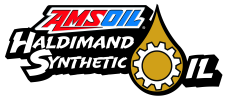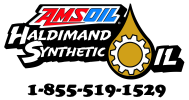
Synthetic Marine Oil FAQs
Why use a dedicated marine motor oil?
AMSOIL marine motor oil protects in demanding operating conditions, from rust and corrosion, and fuel contamination.
Demanding operating conditions
Marine motors are characterized by high-rpm operation that can shear the molecular structure of oil and reduce
its ability to protect against wear. On average, a marine motor propelling a boat 30 mph operates at 5,000 rpm, while an automotive engine powering a car 60 mph operates around 2,000 rpm. The added heat and stress invite wear and deposits. Heavy deposits can cause piston rings to stick, leading to compression loss and reduced power. Stuck rings can also lead to severe piston scuffing.
Rust and corrosion lead to wear
Marine motors are constantly exposed to humid air. The moisture the motor ingests increases the likelihood of corrosion compared to automotive engines. Water-cooled marine motors also run at lower temperatures than air-cooled engines, so moisture in the oil doesn’t evaporate as readily. Plus, when the motor is shut down for the day, moist air continues to enter the engine as it cools, increasing the risk for corrosion, especially if the oil doesn’t contain anti-corrosion inhibitors.
Fuel can contaminate the oil
Outboard motors
typically use lake or river water for cooling. When you start the motor, it immediately draws cold water into the cooling system and circulates it throughout the motor. Compared to an engine with a closed cooling system, meaning one that uses a radiator and coolant, it takes longer to warm-up. A colder engine prevents the rings from sealing completely. More clearance between the ring and cylinder wall allows fuel to leak into the oil sump of four-stroke engines, diluting the oil and reducing its ability to protect against wear.
Is it OK to break in new two-stroke equipment using AMSOIL synthetic motor oils?
YES. There are no problems using AMSOIL synthetic two-stroke oils for break-in periods.
Will using 100:1 mix ratios with AMSOIL Outboard 100:1 Pre-Mix Synthetic 2-Stroke Oil void warranties?
NO. Using AMSOIL Outboard 100:1 at 100:1 mix ratios, where 50:1 is recommended by the manufacturer, will not void warranties. For more information, contact AMSOIL Technical Services at (715) 399-TECH (8324) or tech@amsoil.com.
How often should AMSOIL Gasoline Stabilizer be used in powersports equipment?
AMSOIL Gasoline Stabilizer (AST) should be used when fuel is stored for long-term, seasonal storage. For short- to medium-term storage, AMSOIL Quickshot® (AQS) is recommended.
Can I use AMSOIL HP Marine Synthetic 2-Stroke Oil in my Evinrude® E-TEC™ at the factory-lean setting?
YES. Testing shows that HP Marine meets the stringent performance demands of Evinrude® E-TEC™ marine engines programmed for reduced oil consumption.
Will using AMSOIL synthetic oil void my boat’s warranty?
Using AMSOIL synthetic motor oil does not affect boat warranties. A federal law in the
United Statws called the Magnuson-Moss Act (1975) prevents original equipment manufacturers from putting conditions on vehicle warranties attached to any product or service identified by brand, trade or corporate name, unless the manufacturer provides that product or service free of charge.
The law in Canada states that an OEM cannot require a consumer to use its parts/oil under the threat of voiding the warranty. This practice is referred to as “tied selling” and is in direct violation of the Canadian Competition Act due to its anti-competitive nature.
The Consumer Protection Acts in each province are the Canadian equivalent to the Magnuson-Moss Warranty Act. The law varies by province.
This means consumers have the freedom to use aftermarket products of their choice without fear of losing the original limited or implied vehicle warranty. For additional information, contact the AMSOIL Technical Department at (715) 399-TECH (83425) or
tech@amsoil.com.







 Canada
Canada United States
United States